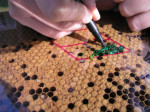Selection and propagation of vital honey bees to lessen colony losses and the use of veterinary drugs in a control concept based on threshold of damage
| Funding code: | 2808UM004 | |
| Acronym: | AVIS | |
| Involved employees: | Dr. K. Ehrhardt, Prof. Dr. K. Bienefeld | |
| Co-operation partners: |
LLH Kirchhain, Arbeitsgemeinschaft Toleranzzucht (AGT), Bieneninstitut Veitshöchheim., Bieneninstitut der Universität Frankfurt, Oberursel |
|
| Duration: | 2008 -2012 | |
| Financing: | German Federal Ministry for Consumer Protection, Nutrition and Agriculture (BMELV) |
With assistance from BMELV and in close cooperation with the bee institutes in Kirchhain and Hohen Neuendorf, the Association of Breeding Tolerance has in recent years successfully developed selection methods for the selection of resistant bees (see final report on 03UM008, dated 12/12/2007). In the meantime, thresholds of infestation can be derived from experiments with untreated test colonies below which a therapeutic control of varroasis may be dispensed with. This opens up new avenues of subjecting untreated colonies to effective selection for vitality and to establish regional instances with a natural selection of their drone populations for disease tolerance. To this end, appropriate selection and propagation methods have to be combined with the use of a control approach based on threshold of damage. Based on results of the third-party funded project (03UM008), a concept is to be developed in cooperation with the Association of Breeding Tolerance that will optimise breeding progress in terms of disease resistance within the level of selection.Furthermore, practical ways of transferring breeding progress within the level of selection to the overall population as efficiently as possible are to be identified.New concepts of breeding value estimation for so-called "all or nothing" traits are to be adapted to the honey bee.
Publications:
- Bienefeld, K. (2009) Zucht mitverantwortlich für Winterverluste? Deutsches Bienen Journal 17(9), 388-389.
- Ehrhardt, K.; Bienefeld, K. (2009) Online data progressing and genetic evaluation for Apis mellifera mellifera. Proc. 9th International Conference of the Societas Internationalis pro Conservatione Apis mellifera mellifera (SICAMM) with Bee Improvement and Bee Breeders' Association (BIBBA) and Scottish Beekeepers Association (SBA), Avimore, p 13.
- Bienefeld, K.; (2010) Does breeding in the honeybee result in higher winter losses? American Bee Journal 150 (4), 385-387
- Ehrhardt, K., Büchler, R.; Bienefeld, K. (2010) Genetic parameters of new traits to improve the tolerance of honeybees to Varroa Mites. Reviewed Proc. 9th World Congress on Genetics Applied to Livestock Production, ID 565, ISBN 978-3-00-031608
- Bienefeld, K. (2010) Ist die Anfälligkeit gegenüber Kalkbrut erblich? Schweizer Bienenzeitung 133(9), 20-22
- Bienefeld, K. (2010) Zuchtziel Varroatoleranz. Die Biene 146(9), 10.
- Bienefeld K. , Erhardt K. (2011) Milestone in Bee Breeding - A Total Breeding value simplifies the Selection Decision. The Scottish Beekeeper 88(3), 78-79
- Büchler, R; Andonov, S; Bienefeld, K; Costa, C; Hatjina, F; Kezij, N; Kryger, P; Spivak, M; Uzunov, A; Wilde, J (2013) Standard methods for rearing and selection of Apis mellifera queens. Journal of Apicultural Research 52(1):1.52.1.07 DOI: 10.3896/IBRA.1.52.1.07
- Development and implementation of a breeding value estimation of the honey bee
- Use and trial of test parameters for the selection of a Varroa-tolerant honey bee in practice
- Selection and propagation of vital honey bees to lessen colony losses and the use of veterinary drugs in a control concept based on threshold of damage


